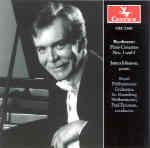The Royal Philharmonic plays beautifully in the C major concerto’s Largo, notably in the rounded, sustained string playing and the excellent woodwind solos. If the orchestra makes less of an impression in the outer movements, it’s only because dozens of other recorded performances offer sharper accentuation, rhythmic verve, and tighter discipline. James Johnson is a tasteful, stylish, and solid soloist. Unfortunately the strident quality of his instrument’s tone at loud moments (further hampered by several horrifically out-of-tune notes in the high register) only exaggerates the lack of tonal variety and nuance in his playing compared with, to name just a few, Fleisher, Rubinstein, Arrau, and Uchida. In short, this 1979 recording faced stiff competition more than two decades ago, and the situation has not changed. Incidentally, Johnson uses the composer’s unfinished first-movement cadenza, capped by his own ending.
The C minor concerto dates from sessions held in St. Petersburg 13 years later, and it benefits from a wider dynamic range. However, this condition hardly affects the piano, which overly dominates the mix, inhabiting a relatively dry ambience in relation to the more resonant orchestral perspective. I can’t pretend to care for Paul Freeman’s machine-like, unyielding, and foursquare phrasing in the outer movements, but I do notice the orchestra’s heightened energy and vibrancy in the Rondo. The central Largo fares best, with Johnson’s sensitive side coming to the fore, notably in the cushion of arpeggios surrounding the woodwind soloists. If only he had allowed his own solo lines to sing out more tenderly and flexibly, à la Rubinstein and Kempff. With superior Beethoven First and Third Concerto couplings by Fleisher/Szell and Rubinstein/Leinsdorf available at less cost, I’m afraid this disc will be a tough sell.
































